MY FAMILY CAMBODIA
Angkor Wat
Angkor Wat is the Seventh Wonders of
the world , locates about 7 km north of Siem Reap province town, Cambodia. The temple was built in the early of 12th
century during the reign of King Suryavarman II (AD 1113-1150), it is an expression of Khmer art and its power of that era.
Angkor Wat, according to Coedès, is a replica of the universe in stone and represents an earthy model of the cosmic world
(Tourism Site of Cambodia,by Keo Phoung, publish July 2, 2003, p.87).
Angkor Wat is the biggest Temple in Siem Reap, it covers a rectangular area of about 200 hectares, 1.5km E-W by 1.3 km N-S. The outer limit of
Angkor are set by its broad moat, faced in laterite and sandstone that has a dimension of 250m long 12m wide.
Angkor Wat Outside perimeter
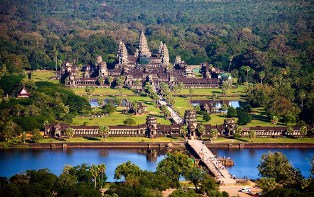
Angkor Wat view from top
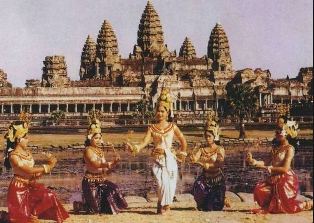
Traditional dancers perform in front of Angkor Wat
The Angkor Wat temple begins with a sandstone terrace in the shape of a cross. The Lions on both sides made by giant stone, symbolized the guardians to the monument. The causeway Cruciform Terrace serves as an entry to tower, from the right side and counter-clockwise monuments are:
Map of Angkor Monument
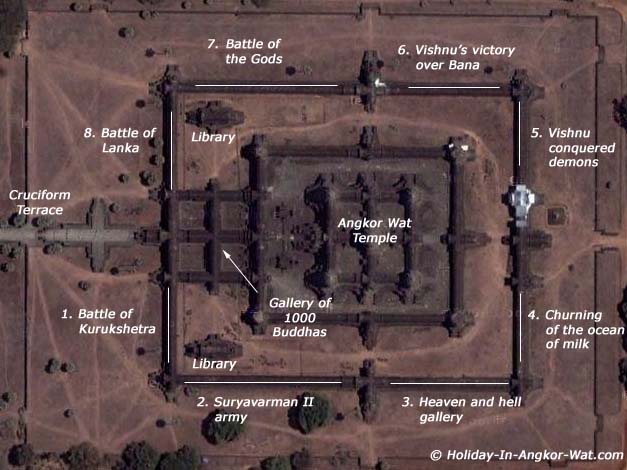
- 1- Battle of Kurukshetra
- 2- Suryavaman II army
- 3- Heaven and hell gallery
- 4- Churning of the ocean of milk
- 5- Vishnu conquered demons
- 6- Vishnu's victory over Bana
- 7- Battle of Gods
- 8- Battle of Lanka
Angkor Wat First level Gallery
Inside Angkor parameter, the "Gallery of 1000 buddhas" are located between the two libraries, north and south side of galleries. Angkor
temple has 3 levels, the cross-shape of the galleries provides a link between the first and second level. Many of the pillars in the galleries of
the courtyard have incriptions written in Sanskrit and Khmer.
View from "Gallery of 1000 buddhas" toward east side, the galleries of bas-reliefs, surround first level, contains an astoning 1200 square meters of
sandstones carving. The bas-reliefs were divided into eight sections, two panels flanking each of the four central entrances and additional
scences in each pavilion at north and south corners of west galleries. The carving describes stories after stories of that era, the best
view is from the front of the Temple walking toward counter-clockwise.
Angkor Wat First level
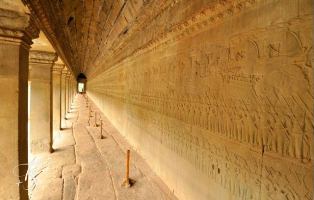
Sandstone carving West side gallery
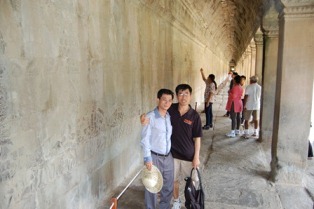
Sandstone carving East side gallery
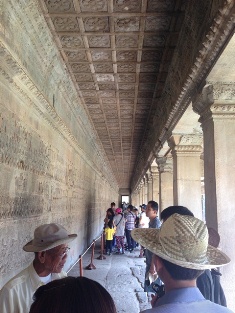
Sandstone carving South side gallery
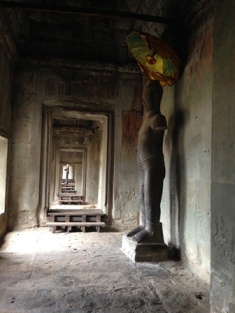
First level hallway along gallery
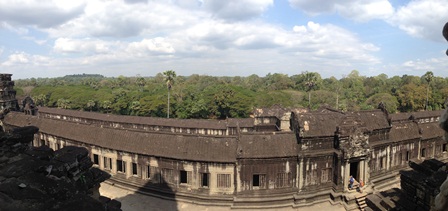
First level north side view from top
Angkor Wat Second level Gallery
The second level, outer wall was not decorated, it is more of a reserves space for meditation by the king, priests or king's associates. The interior wall of gallery offered an endless visual of spiritual enchantment, over 1500 Apsaras line on wall.
Angkor Wat Second level
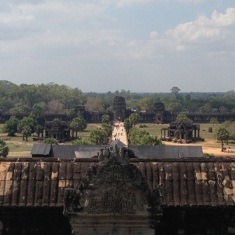
Second level view to main gate
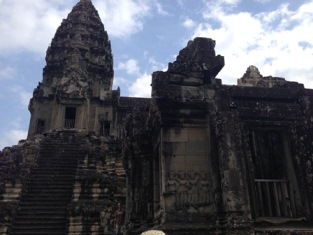
Second level Apsara statues
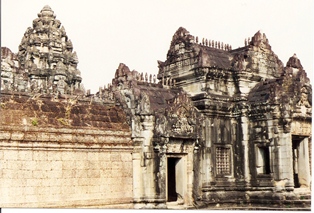
Second level Front view
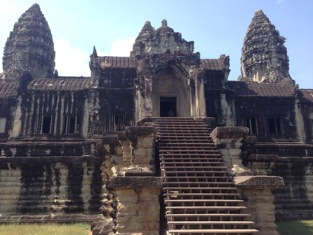
Second level Rear view
Angkor Wat Upmost level Tower
The third level (upper level) preserved for the king and priest, the five towers stood up on this level, all connected to each other. Their bases extended 60 square meters, from corner to corner. Four of the towers rised at each corner, while the central tower and shrine stood up obove those four; it has 42 meters of height above the second level. Six sets of stairs with 40 steps each, one at the center of each side, and the other two at the corner, those stairs give access to the topmost level.
Angkor Wat Upmost level
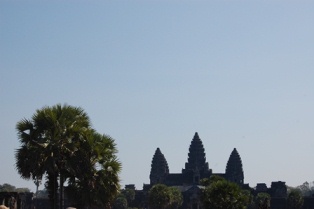
Upmost level view from distance
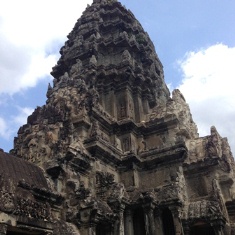
Upmost level Center Tower
My Journey to Angkor Temples
My tour to Angkor Wat temple splits to two sessions, the morning and afternoon. During the morning tour, I'm taking my
time to view all the monuments, arts, gallery and statues and learn everything I want to know.
The trip in the afternoon when the sundown, the shadow of temples floats in lotus pond was quite amazed of how the temple's architecture.
The same afternoon trip, I'm walking up hill to the top of Bakheng Temple, a great workout distance, also to view Angkor Wat and its
perimeter and enjoy the sunset.
My best visit to Angkor Wat was during my second trip in 2013, with a tour guide's help, walking through all the history about temples,
background stories of carving arts on the wall from beginning to end. I admire the power of Knmer empire in that era.
Tour around Angkor Temples
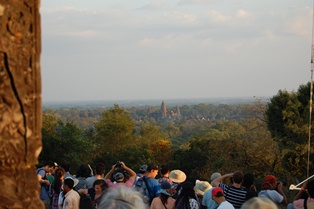
Angkor Temple view from Bakheng temple
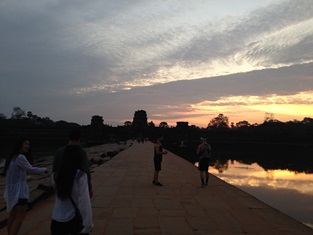
Angkor Temple amazing view during sunset
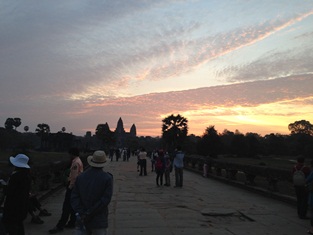
Angkor Temple amazing view during sunset